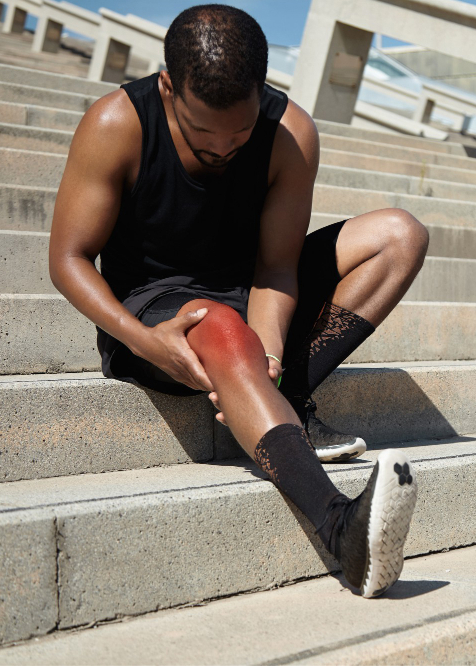Are you struggling with swelling, stiffness, and knee pain that won’t go away? In many cases, the cause is inflammation, and cortisone knee injections can help reduce it and provide lasting relief without constant discomfort. If knee pain is limiting your mobility or quality of life, this simple, targeted treatment can help you move freely again. That’s why at PRP in Seattle, our top providers use precision-guided injections and regenerative techniques to deliver accurate, comfortable care every time.
What are Cortisone Knee Injections?
Cortisone knee injections, often referred to as steroid shots, are quick, minor medical treatments that deliver a concentrated dose of inflammatory corticosteroid (usually mixed with a small amount of local anesthetic) directly into a knee joint. By reducing inflammation in the joint, they can ease swelling, stiffness, and pain for several weeks to months.
Benefits of Taking Cortisone Knee Injections
When knee pain, swelling, or stiffness is caused by inflammation, cortisone knee injections provide a fast, focused solution that helps you feel better and move more easily. Here are some of the benefits of receiving a cortisone injection for the knee:
- Fast pain relief: Many patients experience noticeable improvement within 24-72 hours as inflammation begins to subside.
- Powerful, targeted anti-inflammation: The medication is placed directly into the knee joint, providing localized and efficient relief.
- Improved mobility and function: By reducing stiffness and inflammation, cortisone injections can make movement easier and more comfortable.
- Minimally invasive and quick: It’s a simple procedure that typically takes less than 10 minutes and doesn’t require anesthesia or downtime.


Ideal Candidate for Cortisone Knee Injections
An ideal candidate for cortisone knee injections is an individual experiencing localized pain and inflammation that hasn’t improved with rest, physical therapy, or oral medications. You are a good candidate if:
- You have been diagnosed with knee inflammation (such as arthritis or bursitis)
- You need short-term relief or want to postpone knee surgery
- You cannot tolerate oral anti-inflammatory medications (NSAIDs)
If a plastic surgeon from PRP in Seattle confirms knee inflammation is the primary cause of your symptoms and simpler treatments haven’t solved the issue, a cortisone injection can be a safe, targeted way to reduce knee pain and swelling. We will review your full health history and goals before deciding whether you are an ideal candidate.
What to Expect During Your Cortisone Knee Injection Appointment at PRP in Seattle
A cortisone shot for the knee is quick and straightforward. Your visit begins with a short check-in and consultation with Dr. Khezri, who will review your condition and confirm that knee inflammation is the cause of your symptoms. On the day of your appointment, the healthcare provider will clean and numb the area around your knee before providing a small injection directly into the joint. The whole process typically takes less than 15 minutes. There can be mild soreness afterward, but most people begin to notice relief within 2-3 days.
Recovery and Aftercare
After receiving a cortisone injection in the knee, there is minimal downtime of 24-48 hours. For the first 24 hours, avoid any rigorous activity, heavy lifting, or high-impact movements involving the knee. Mild soreness or temporary increase in pain can occur within the first 48 hours; if it happens, applying ice for 15-20 minutes can help reduce discomfort. Avoid using heat, such as hot tubs or saunas. You can normally return to daily activities within a day or two.
Results
Cortisone injections in the knee provide temporary pain reduction rather than a permanent cure. After the shot, if a local anesthetic is included, some people may feel immediate numbness or reduced knee pain within a few hours. The duration of relief can vary, and some may experience its benefits for a week, while others may have several months of reduced pain and inflammation.
Over time, the symptoms may return as the medication wears off. For long-term knee pain management, cortisone injections can be used in combination with physical therapy, medications, or lifestyle changes. Repeat injections may be required every 3 to 6 months, depending on the condition and treatment response.
Cost & Financing Options for Cortisone Knee Injections
Cortisone injection costs for the knee can vary depending on the provider and whether imaging guidance is required. In Seattle, a knee injection is generally affordable, but pricing may differ based on individual needs. If you require financial assistance, we also work with third-party lenders like CareCredit, ALPHAEON Credit, and United Medical Credit, and offer flexible in-house payment plans. So, feel free to discuss your options during the consultation, and our team will help you find the plan that best fits your needs.
Interested in the Cortisone Knee Injections?
Fill out the form below to schedule your free consultation or ask any questions you may have.
Book Your Consultation with PRP in Seattle Today
Don’t let knee pain or inflammation limit your daily routine. Whether you need short-term relief or a longer-term strategy to manage knee discomfort, our team is here to guide you through every step. Call (206) 279-2112 or click here if you need more information about cortisone injections.
FAQs
What do Cortisone Injections do?
Cortisone injections reduce inflammation in specific areas of the body, typically joints, tendons, or bursae, by delivering a powerful corticosteroid directly into the site of pain.
How long do you have to wait for Knee Replacement after Cortisone Injections?
Most surgeons recommend waiting at least 3 months after a cortisone injection before undergoing knee replacement surgery. This reduces the risk of injection and allows the steroid’s effects to subside.
What are the Disadvantages and Side Effects of Cortisone Injections?
Common drawbacks of cortisone injections include temporary pain flare-ups, skin thinning, tendon weakening, joint infection, and elevated blood sugar, especially in diabetics. Repeated injections in the same area can often lead to joint damage over time.
How much are Cortisone Injections?
The costs typically range from $100 to $300 per injection. However, insurance may help you cover some or all of the cost.
Are Cortisone Injections Bad for You?
When used appropriately, cortisone injections are generally safe. However, frequent or high-dose injections can weaken tissues, increase infection risk, or accelerate joint degeneration.
Can you get Cortisone Injections after Knee Replacement?
Cortisone injections are usually not recommended in the replaced joint.
Can Cortisone Injections Cause Headaches?
Yes, though uncommon, cortisone injections can cause headaches, especially if the steroid enters the bloodstream or if there’s a reaction to the injection. Other systemic symptoms may include facial flushing or dizziness.
Can Urgent Care do Cortisone Injections?
Some urgent care centers can administer cortisone injections. However, for precision or chronic conditions, it’s best to visit a specialist.
How often will Insurance Pay for Cortisone Injections?
Most insurance plans cover up to 3-4 injections per year per joint, provided they are medically necessary and documented. However, coverage may vary depending on the insurer and the condition being treated.
How long do you have to wait for a Hip Replacement after Cortisone Injections?
Similar to knee replacement, a minimum wait time of 3 months is usually recommended to reduce infection risks and avoid complications during hip replacement surgery.
Are Cortisone Injections Good for Plantar Fasciitis?
Yes, cortisone injections can be effective for short-term relief of plantar fasciitis pain. However, repeated use may weaken the plantar fascia or lead to rupture, so they are typically reserved for cases that don’t respond to other treatments.
References:
[1]https://pmc.ncbi.nlm.nih.gov/articles/PMC9465610
[2] https://pubmed.ncbi.nlm.nih.gov/38420745/
[3]https://columbiapain.org/platelet-rich-plasma-in-the-management-of-patellofemoral-pain-syndrome-a-clinical-perspective
[4] https://pubmed.ncbi.nlm.nih.gov/35509070/
[5] https://pmc.ncbi.nlm.nih.gov/articles/PMC10960087
STILL HAVE QUESTIONS?
Give us a call at (206) 279-2112. Chat by clicking the icon in the lower left hand corner of your screen. Otherwise, contact us by filling out the form above.
